May 16, 2025 | 07:08 GMT +7
May 16, 2025 | 07:08 GMT +7
Hotline: 0913.378.918
May 16, 2025 | 07:08 GMT +7
Hotline: 0913.378.918
Bo Hac village, known for its distinct highland microclimate in Vietnamese Northwest region, is bustling with activity as locals tend to their winter crops. Despite the recent heavy rains caused by two storms, which impacted various crops, residents are striving to recover losses by intensifying winter production efforts.
While traditional vegetable farming remains common, fluctuating prices and increased competition from advanced lowland agricultural cooperatives are driving local farmers to seek distinctive, competitive winter crops.
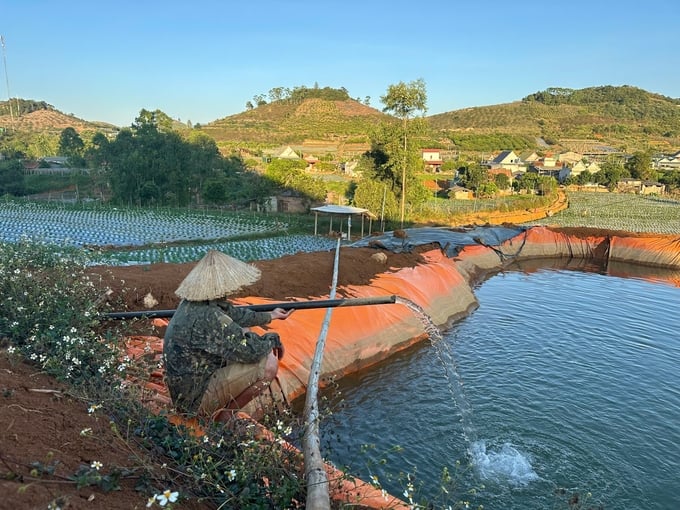
In the winter season in Mai Son (Son La), locals are always concerned about the water supply for irrigation, so they have to drill wells or bring water from the irrigation system to store. Photo: Duc Binh.
In the winter crop season, many households still focus on growing vegetables, even though prices can sometimes be unstable due to increasing supply, especially as cooperatives in the lowlands have many advantages, from geographical proximity to advanced techniques and technology used in production. This has forced the people in the village to gradually find ways to adapt, creating distinctive winter vegetable products with high competitiveness.
The Van Phuc Safe Vegetable Cooperative (Co Noi commune, Mai Son district) is known as a reputable place for vegetable production but has now shifted to a promising new direction by experimenting with growing Jalapeno peppers for export.
With a total area of 11 hectares, the cooperative has planted various vegetables and strawberries, but the most notable is 4 hectares dedicated to growing Jalapeno peppers. This pepper variety is being grown in collaboration with a food processing company in Bac Giang. These experiments not only mark a turning point in the cooperative's production direction but also open up sustainable development opportunities for local farmers.
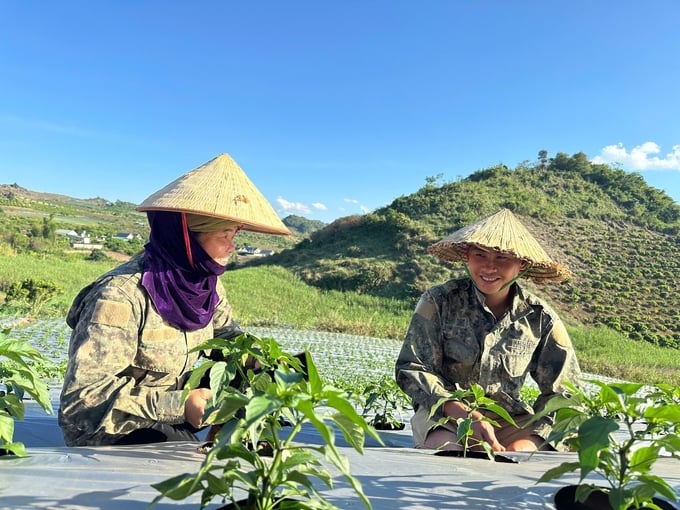
Ms. Lo Thị Thuy, Director of the Van Phuc Safe Vegetable Cooperative (left), could not hide her joy at the initial success of the experimental planting of Jalapeno peppers. Photo: Duc Binh.
Jalapeno peppers, originating from Mexico, are a hybrid variety known for their strong growth and good disease resistance. The plants develop robustly and yield high quantities, with each plant producing 50 to 80 peppers. The peppers have a unique shape resembling a shell casing, measuring 6 to 8 cm in length, about 4 cm in diameter, and weighing between 20 and 45 grams each. The average yield reaches 45 to 60 tons per hectare, and it can go up to 70 tons with intensive farming under optimal conditions.
The ideal soil for growing Jalapeno peppers is loose, nutrient-rich loam that drains well and is easy to irrigate. The seedlings should be healthy, and the planting distance should be 50x40 cm, ensuring proper spacing for optimal plant development. The primary fertilizers used are organic manure and well-composted animal dung at a rate of 7.5 tons per hectare, followed by a low amount of N-P-K fertilizer, approximately 0.9 to 1.05 tons per hectare. During the growing process, it is necessary to regularly prune old leaves to create good airflow in the garden, which helps minimize pest and disease risks.
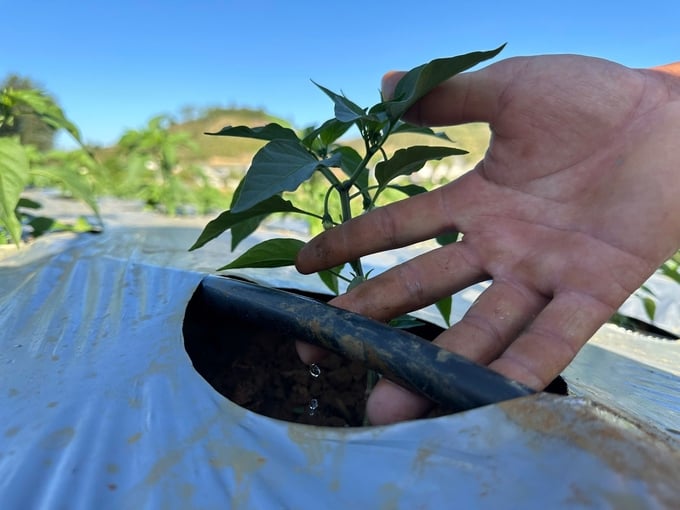
The drip irrigation system was invested in to save water for this winter crop season. Photo: Duc Binh.
Ms. Lo Thi Thuy, Director of the Van Phuc Safe Vegetable Cooperative, has dedicated over 2 hectares of land to planting this pepper variety. With 3,500 plants per hectare, the investment cost for seedlings is nearly VND 40 million. Additionally, investments of about VND 60 million have been made for drilling wells, installing a drip irrigation system, and covering the beds with plastic sheeting.
The entire production process at the cooperative uses modern technologies and techniques. From bed preparation and mulching to plant care, members are directly guided by experts from the Institute of Vegetable and Fruit Research (Vietnam Academy of Agricultural Sciences). The cooperative also uses the Zalo app to connect members, create groups for sharing experiences, and promptly address pest and disease issues.
When facing production difficulties, members can report them to the group to receive expert support. This approach not only improves farming efficiency but also helps members learn from each other and enhance their production skills.
To ensure stable product output, the Van Phuc safe vegetable Cooperative has signed a cooperation agreement with a food processing company in Bac Giang. Under the agreement, the company provides pepper seedlings at a subsidized price of VND 500 per plant and offers technical support from experts at the Institute of Vegetable and Fruit Research. The production process follows organic principles. Additionally, the company has committed to purchasing all the products at a price of VND 7,000 per kilogram.
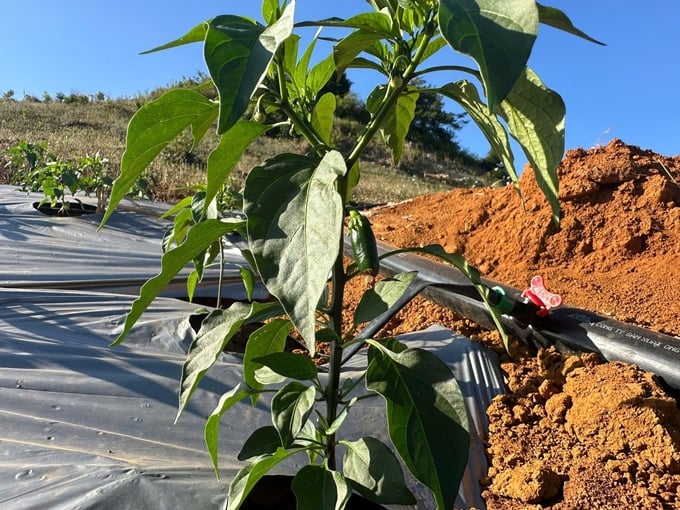
The peppers have started to bear fruit, and it is expected that the harvest will be possible by the end of December. Photo: Duc Binh.
This type of pepper is primarily processed into pickled products in jars for export to major markets such as South Korea, Japan, the United States, and Europe. With an expected yield of 30-40 tons per hectare, the cooperative anticipates a profit of VND 500-600 million across the 4-hectare area after deducting expenses. This is a promising figure compared to traditional vegetable crops, especially given the low vegetable prices in winter due to competition with lowland provinces.
Ms. Thuy shared, "If this winter crop is successful, the cooperative will expand the area planted with peppers and encourage other households in the commune to participate. This is a long-term and sustainable direction, especially in the context of increasingly fierce competition in the vegetable market."
Despite the great economic potential, growing Jalapeno peppers at the cooperative still faces several challenges. The prolonged dry weather during winter leads to a lack of irrigation water, and the risk of pests remains a concern during this first trial. The initial investment in the drip irrigation system is relatively high to ensure adequate watering for the winter season. However, with support from experts and the cooperation of all the cooperative members, these difficulties are gradually being overcome.
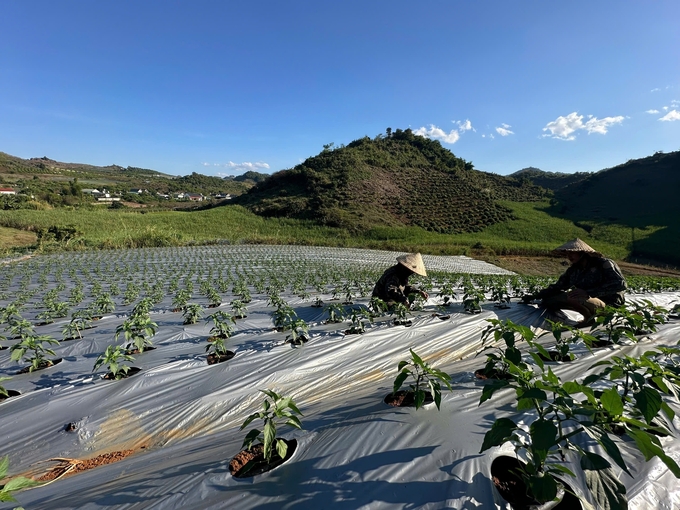
The Van Phuc safe vegetable Cooperative is experimenting with planting Jalapeno peppers on an area of 4 hectares. If successful, they plan to expand further within the commune. Photo: Duc Binh.
According to Ms. Cam Thi Phong, Deputy Director of the Son La Department of Agriculture and Rural Development, the province is actively promoting production linkage models among enterprises, cooperatives, and cooperative groups along the value chain. The goal is to support farmers in marketing their winter crops, ensuring stability and confidence in production.
Son La's agricultural sector has implemented numerous support programs to assist disadvantaged households in developing production while aligning with two key provincial goals: boosting exports and increasing the proportion of processed products.
To achieve these objectives, infrastructure investments have been made in key agricultural production areas, including in-field transportation systems, irrigation systems, and modern processing facilities. These efforts enhance local agricultural branding and expand market access for Son La's produce.
Son La has been focusing on attracting investment in agricultural product processing. Major enterprises such as Phuc Sinh, Minh Tien, Doveco, and Nafoods have established modern processing plants and collaborated with local farmers to develop raw material areas. This not only creates jobs and stabilizes market outlets for agricultural products but also enhances product value and improves farmers' incomes.
Translated by Kieu Chi

(VAN) Japan's efforts to lower the price of rice through the release of its stockpile may finally be making some progress, albeit at a snail's pace.

(VAN) U.S. tariffs are not only a 'shock', but also an opportunity for Vietnamese businesses to renew their mindset toward comprehensive development.

(VAN) As Bac Giang lychee enters the harvest season, Minister Do Duc Duy expects that the fruit will contribute greatly to agricultural exports due to standardized production and deep processing.

(VAN) Consumers have shown a preference for free-range eggs, but those farming systems are more vulnerable to biosecurity risks like bird flu.
/2025/05/09/5701-1-184335_301.jpg)
(VAN) Vietnam’s eel exports nearly doubled thanks to a mud-free farming model, opening up new prospects while still facing numerous barriers related to international standards.

(VAN) Minister Do Duc Duy warned that if production is not professionalized and supply chains are not transparent, the U.S. market could become a growth bottleneck.
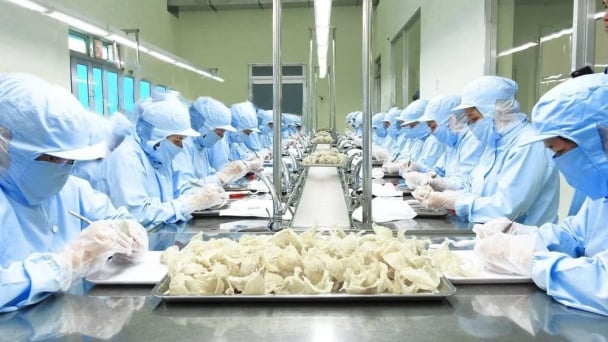
(VAN) Delegating surveillance responsibilities to local authorities is a cost-saving and efficiency-boosting measure that removes a key bottleneck for enterprises, according to Director General Duong Tat Thang.